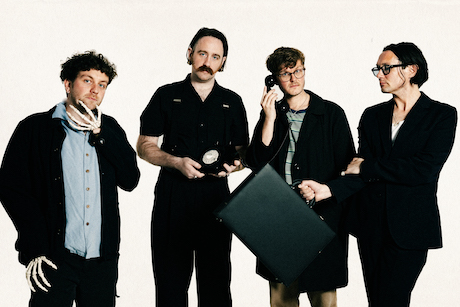
Tuesday October 15
YARD ACT
OMNI
$25 / Doors at 7:30

What do you do when everything you’ve ever wanted suddenly lands in your lap, but the questions still keep on coming?
Since first steering their golden Rover into swift public acclaim back in 2020, Leeds quartet Yard Act have become one of the great indie success stories of the decade so far. Along the way, they’ve ticked off milestones ranging from a Number Two chart placing and Mercury Prize nomination for debut album ‘The Overload’, to a co-sign from Elton John who joined the band to guest on a string-laden reworking of album closer ‘100% Endurance’.
Yet, whilst the band’s trajectory continuously shot upwards, vocalist James Smith and his wife had also welcomed in a son. And it’s this duelling sense of responsibility and ambition, guilt, love, drive and everything in between that forms the narrative backbone of brilliantly exploratory second album ‘Where’s My Utopia’.
Written in snapshots of time between a relentless touring schedule, and produced jointly by the band and Gorillaz’ Remi Kabaka Jr, the quartet’s second act is a giant leap forward into broad and playful new sonic waters. “The main reason that ‘post-punk’ was the vehicle for Album One was because it was really affordable to do, but we always liked so much other music and this time we’ve had the confidence to embrace it,” James explains. Across the record, influences ranging from Fela Kuti to Ennio Moricone via Spiller’s ‘00s pop smash ‘Groovejet’ make themselves known.
It’s a celebratory palette upon which Smith allowed himself to reach lyrically deeper into himself than ever. Gone, largely, are the outward-facing character studies of yore, replaced with a set of songs that stare fully into the headlights of life, wrangling with the frontman’s own fears and foibles to create a sort of Promethean narrative - but with jokes. “You can commit to the idea that we’re just animals who eat and fuck and then we die, and that’s fine,” he suggests. “But for me, creativity always seems to be the best way of articulating the absolute minefield of what human existence is.”


